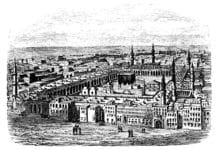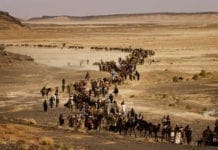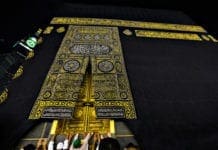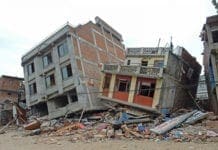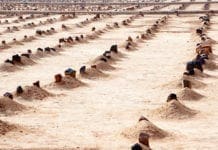It is predestined that the events weave the course of history. These events are an interaction between people and destiny. It always happens that man stands helpless before destiny, having no power to prevent it. Therefore, he accepts it, not out of weakness or negligence, but out of a wisdom known by the Almighty.
History records such events as long as there is a world living. Hence, when we recollect such events, we analyze them and then rewrite them not according to our personal perceptions, but according to what had really happened to the people involved!
The status of the Ka’bah has influenced its history. It lured many tribes living in the neighborhood to try to usurp leadership from the children of Isma’il. Among these tribes was the tribe of Jurhum who inhabited the area of Qu’ayqi’an, at the northern borders of Makkah. They were driven by their large numbers and urge for power. They were also encouraged by the fact that they were the first inhabitants of Makkah (after Hajar’s arrival) and Isma’il married from their tribe, ‘Atikah bint ‘Amr al-Jurhumi. Furthermore, they had a well-experienced leader, Madad ibn ‘Amr, who was acquainted, through frequent visits, with the affairs of the Levant, Iraq and Egypt. Thus, he hoped to set up a powerful state of which Makkah would be its center.
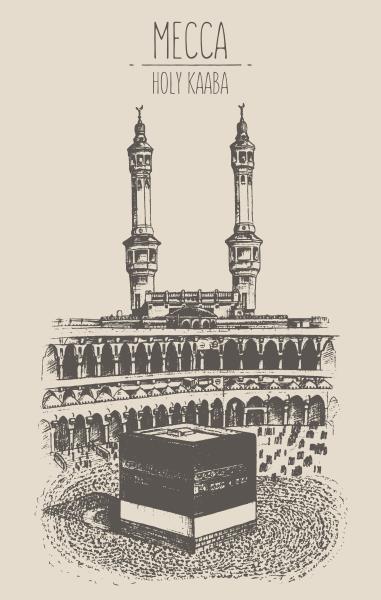 Another tribe was that of Qatura’, descendants of al-‘Amaliq, who were settled in the west of Makkah and used to frequent the valley of Makkah for some days every year. In these days, they would graze their camels and sheep. They believed that they were more entitled to leadership. Besides, their chief, as-Samayda’ ibn ‘Imliq was a courageous and well-experienced person.
Another tribe was that of Qatura’, descendants of al-‘Amaliq, who were settled in the west of Makkah and used to frequent the valley of Makkah for some days every year. In these days, they would graze their camels and sheep. They believed that they were more entitled to leadership. Besides, their chief, as-Samayda’ ibn ‘Imliq was a courageous and well-experienced person.
The third tribe was Khuza’ah who dwelled in Tihamah, waiting for an opportunity to seize the leadership of Makkah.
On the other hand, Qidar ibn Isma’il, who succeeded his brother Nabit in running the affairs of the war too old and weak to manage it well. Thus, he transferred custody to his (maternal) cousins, the tribe of Jurhum, who – wasting not the opportunity – imposed a decimal tax on the trade coming from North Makkah. The descendants of al-‘Amaliqharbored a grudge against the tribe of Jurhum for what they had gained of money and what they had assumed of honor by their guardianship over the Ka’bah. Such malice bred mutual hostility between the two parties; Jurhum and al-‘Amaliq, which entailed competition, controversy and conflict. This tense relationship moved the leader of the descendants of al-‘Amaliq to impose a similar tax on the trade coming to Makkah from the south.
The situation intensified when, one day, Jurhum and the descendants of al-‘Amaliq were vilifying each other. Each one was boasting (in the Ka’bah) and attesting lineage to Nuh(peace be upon him). Then, the descendants of al-‘Amaliq claimed that they are the offspring of the angels. Soon a war broke out between the two parties, in the Ka’bah, during which Madad al-Jurhumi killed as-Samayda’. Hence, the Ka’bah turned into a battlefield on which a lot of blood was shed. The number of pilgrims decreased dramatically for they feared for their lives and wealth. People wished that the light of the Almighty would shine in the hearts of the fighting parties, guiding them back to the right path.
For their mischief, Allah decreed that His Wrath be inflicted on the people; thus, a violent torrent of rain flooded their lands, tents, and goods and, also, caused cracks in the walls of the Ka’bah. It was a trial for the people, so that they might learn the lesson. It was hoped that light might dawn and dispel all the clouds of mist and darkness. The children of Isma’ilgrieved over the misfortune that befell the people and the Ka’bah. They might have been regretful for relinquishing leadership to Banu Jurhum. In the meantime, they were obliged to take a neutral stand to avoid a blood bath. Thus, as they gathered to take counsel, some of them said, “This is the House which Ibrahim and Isma’il built; and this is the Well of Zamzam, Almighty Allah caused its water to gush out for Hajar, as a kind of mercy towards (her son) Isma’il … And this is Makkah, which was, until a very recent time, a desolate wasteland. However, it has turned, thanks to the Well of Zamzam and the House of Allah, into an oasis full of inhabitants and crowded with pilgrims who come to answer the Call of the Almighty uttered by His Prophet and Intimate Friend, Ibrahim. Hence, no one should assume responsibility for such affairs but the children of Isma’il.” While some others retorted, “As it is the Inviolable House of Allah, there should be no shedding of blood in it. Surely, the Almighty has made it a secure sanctuary.” In addition, a third team declared, “Besides the fact that we, being the children of Isma’il, are more entitled to assume responsibility for the House (of Allah) and the pilgrims, there is a maternal affinity between us and the tribe of Jurhum; Isma’il‘s wife ‘Atikah belongs to the tribe of Jurhum. Through this marital bond with the tribe of Jurhum, we do not want to sever such ties.” Following this, children of Isma’il relinquished leadership to al-Harith ibn Madad. They were not driven by weakness or languish; rather, it was their desire to prevent bloodshed in the House of Allah that moved them to relinquish leadership. They respected the affinity of kinship and marital relations. Moreover, the children of Isma’il effected a reconciliation between the tribe of Jurhum and the descendants of al-‘Amaliq, who had retreated (from the battlefield) after the death of their leader, as-Samayda’. However, the tribe of Jurhum misused rulership. The only good deed that they are noted for was for restoring and raising the walls of the Ka’bah after they had been damaged by the torrential rains. Aside from that, they spread corruption in Makkah, exacted high taxes and overburdened caravans with tributes, seized the money assigned for the Ka’bah, stole all that was in it of treasures and gifts and stinted in measuring and weighing. They led people away from the faultless religion; the religion of Ibrahim and Isma’il, and spread fear and corruption in Makkah and the vicinity over a period of three hundred years. It was one of the worst stages in the history of Makkah.
 The tribe of Jurhum did not absorb the painful lesson of the preceding nations like ‘Ad (the people of Hud) and Thamud (the people of Salih); thus, the friendly relations between them and neighboring tribes declined. Fallen faces of distress greeted Jurhum whenever they came to circumambulate the Ka’bah. Even the caravans that used to pass by Makkah during their journeys trod different ways seeking safety and security away from them. As people raised their voices in supplication imploring the Almighty for salvation, He (Glorified and Exalted be He) responded by taking revenge on those who offended His religion and frightened the people in His House. Almighty Allah inflicted a severe punishment on the people of Jurhum – He caused them to suffer continuous nosebleed, the result of which they would choke on food and taste turbidity and staleness in their drink. To impose upon them further suffering, the Almighty sent ants over which they would stumble. The ants covered their bodies and faces and entered their mouths and nostrils while they remained helpless. In vain, the people of Jurhum strove hard to terminate the armies of ants creeping towards them from every corner. They ran away seeking salvation, but the ants followed them till by the fall of night, they reached an area called Idam. No sooner had they taken rest than the area was swept by a flood, from which they could not escape; they perished as a reward for their oppression.
The tribe of Jurhum did not absorb the painful lesson of the preceding nations like ‘Ad (the people of Hud) and Thamud (the people of Salih); thus, the friendly relations between them and neighboring tribes declined. Fallen faces of distress greeted Jurhum whenever they came to circumambulate the Ka’bah. Even the caravans that used to pass by Makkah during their journeys trod different ways seeking safety and security away from them. As people raised their voices in supplication imploring the Almighty for salvation, He (Glorified and Exalted be He) responded by taking revenge on those who offended His religion and frightened the people in His House. Almighty Allah inflicted a severe punishment on the people of Jurhum – He caused them to suffer continuous nosebleed, the result of which they would choke on food and taste turbidity and staleness in their drink. To impose upon them further suffering, the Almighty sent ants over which they would stumble. The ants covered their bodies and faces and entered their mouths and nostrils while they remained helpless. In vain, the people of Jurhum strove hard to terminate the armies of ants creeping towards them from every corner. They ran away seeking salvation, but the ants followed them till by the fall of night, they reached an area called Idam. No sooner had they taken rest than the area was swept by a flood, from which they could not escape; they perished as a reward for their oppression.
When the people of Jurhum sensed their demise, their last chief al-Harith III headed for the Ka’bah and took two golden deer and some swords and shields that were inside it. He felt that he was being watched, so he threw all what he seized into the Well of Zamzam and covered them with sand. Then, he returned to his people who started to leave Makkah.
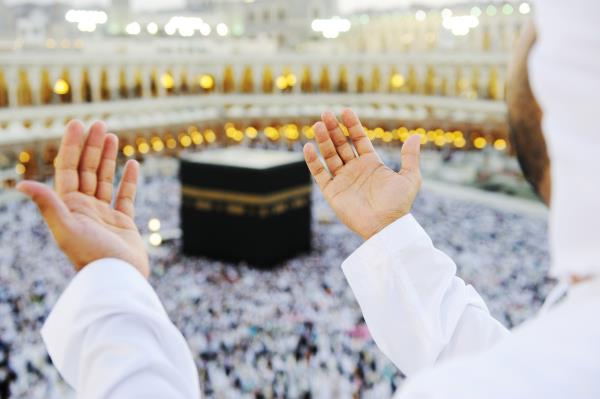 Thusly, Makkah was cleansed of the enemies of Allah’s Religion and the management of the affairs of the Ka’bah was returned to the children of Isma’il through Nizar ibn Ma’d ibn ‘Adnan. Makkah began to prosper again, the number of pilgrims increased and caravans started to frequent the path of Makkah through their journeys. Since the children of Isma’ilwere firm adherents of the religion of their grandfather Ibrahim, they set out to propagate it and teach people the Scriptures (of Ibrahim).
Thusly, Makkah was cleansed of the enemies of Allah’s Religion and the management of the affairs of the Ka’bah was returned to the children of Isma’il through Nizar ibn Ma’d ibn ‘Adnan. Makkah began to prosper again, the number of pilgrims increased and caravans started to frequent the path of Makkah through their journeys. Since the children of Isma’ilwere firm adherents of the religion of their grandfather Ibrahim, they set out to propagate it and teach people the Scriptures (of Ibrahim).
Life in Makkah streamed along, and when death came to Nizar, he bequeathed guardianship to his son Iyad. Only after a short while, there emerged a conflict between Iyad and his brother Mudar over leadership. When they were on the verge of war, Mudar came out victorious.


